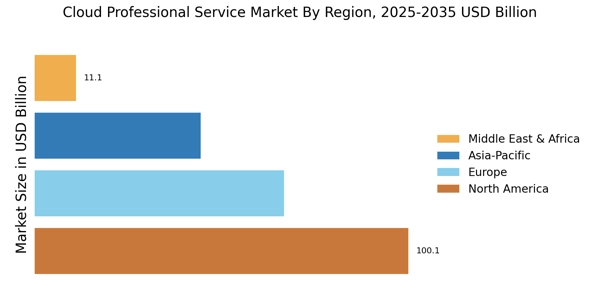Expansion of Multi-Cloud Strategies
The Cloud Professional Service Market is witnessing a significant expansion of multi-cloud strategies among enterprises. Organizations are increasingly adopting a multi-cloud approach to avoid vendor lock-in and enhance resilience. This trend is indicative of a broader shift towards hybrid cloud environments, where businesses utilize multiple cloud service providers to optimize their IT infrastructure. Recent studies indicate that nearly 80% of enterprises are expected to implement multi-cloud strategies by 2026. This shift presents a substantial opportunity for the Cloud Professional Service Market, as service providers offer expertise in managing and integrating diverse cloud environments.
Advancements in Cloud Security Solutions
Advancements in cloud security solutions are a pivotal driver in the Cloud Professional Service Market. As cyber threats continue to evolve, organizations are increasingly prioritizing the security of their cloud environments. This has resulted in a growing demand for professional services that specialize in cloud security assessments, implementation, and ongoing management. Recent market analyses suggest that the cloud security services segment is expected to grow at a rate of approximately 30% over the next few years. Consequently, the Cloud Professional Service Market is likely to see a surge in service offerings aimed at enhancing the security posture of cloud-based systems.
Rising Demand for Cloud Migration Services
The Cloud Professional Service Market experiences a notable surge in demand for cloud migration services. Organizations are increasingly recognizing the need to transition from on-premises infrastructure to cloud-based solutions. This shift is driven by the desire for enhanced scalability, flexibility, and cost efficiency. According to recent data, the cloud migration services segment is projected to grow at a compound annual growth rate of approximately 20% over the next five years. As businesses seek to modernize their IT environments, the Cloud Professional Service Market is poised to benefit significantly from this trend, as service providers offer tailored migration strategies to meet diverse client needs.
Increased Regulatory Compliance Requirements
The Cloud Professional Service Market is also influenced by increased regulatory compliance requirements. As data privacy and security regulations become more stringent, organizations are compelled to ensure that their cloud services adhere to these standards. This has led to a heightened demand for compliance-focused cloud professional services. Service providers are now offering specialized solutions to help businesses navigate complex regulatory landscapes, ensuring that their cloud operations remain compliant. The market for compliance-related cloud services is projected to grow significantly, reflecting the critical importance of regulatory adherence in the Cloud Professional Service Market.
Growing Emphasis on Data Analytics and Insights
In the Cloud Professional Service Market, there is a growing emphasis on data analytics and insights. Organizations are increasingly leveraging cloud-based analytics tools to derive actionable insights from vast amounts of data. This trend is fueled by the need for data-driven decision-making and improved operational efficiency. The market for cloud analytics services is expected to expand rapidly, with estimates suggesting a growth rate of around 25% in the coming years. As businesses strive to harness the power of data, the Cloud Professional Service Market is likely to see a corresponding increase in demand for analytics-focused services, enabling organizations to gain a competitive edge.

















